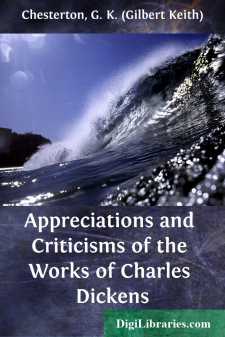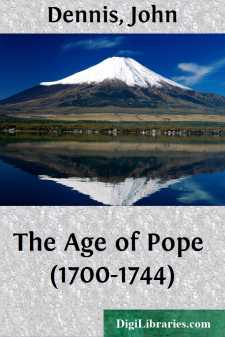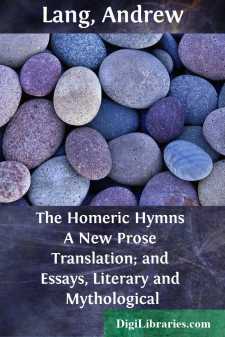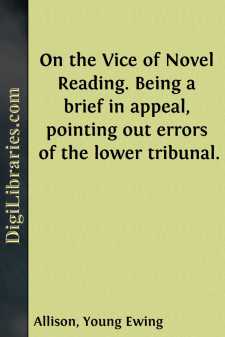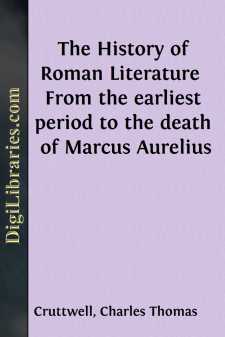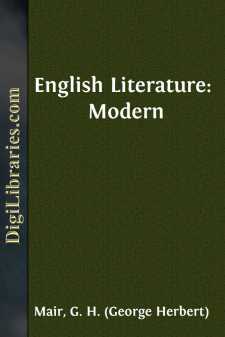Literary Criticism
- American 18
- Ancient and Classical 3
- Asian 1
- Australian & Oceanian 1
- Books & Reading 8
- Caribbean & Latin American 2
- Drama 2
- English, Irish, Scottish, Welsh 49
- European 7
- General 37
- Horror 1
- Humor 2
- Jewish 2
- Medieval 2
- Middle Eastern 3
- Poetry 7
- Renaissance 6
- Russian & Former Soviet Union 1
- Shakespeare 27
Literary Criticism Books
Sort by:
INTRODUCTION These papers were originally published as prefaces to the separate books of Dickens in one of the most extensive of those cheap libraries of the classics which are one of the real improvements of recent times. Thus they were harmless, being diluted by, or rather drowned in Dickens. My scrap of theory was a mere dry biscuit to be taken with the grand tawny port of great English comedy; and...
more...
LITERARY FRIENDS AND ACQUAINTANCES—First Visit to New EnglandBIBLIOGRAPHICAL Long before I began the papers which make up this volume, I had meant to write of literary history in New England as I had known it in the lives of its great exemplars during the twenty-five years I lived near them. In fact, I had meant to do this from the time I came among them; but I let the days in which I almost...
more...
by:
John Dennis
INTRODUCTION. The death of John Dryden, on the first of May, 1700, closed a period of no small significance in the history of English literature. His faults were many, both as a man and as a poet, but he belongs to the race of the giants, and the impress of greatness is stamped upon his works. No student of Dryden can fail to mark the force and sweep of an intellect impatient of restraint. His...
more...
by:
Andrew Lang
ESSAYS INTRODUCTORY THE SO-CALLED HOMERIC HYMNS “The existing collection of the Hymns is of unknown editorship, unknown date, and unknown purpose,” says Baumeister. Why any man should have collected the little preludes of five or six lines in length, and of purely conventional character, while he did not copy out the longer poems to which they probably served as preludes, is a mystery. The...
more...
ON THE VICE OF NOVEL READING. Ever since the Novel reached the stage of development where it was demonstrated to be the most ingenious vehicle yet designed for conveying the protean thought and fancy of man, there has stood in the judgment book of Public Opinion the decree that novel-reading was a vice. Of course, that judgment did not apply exclusively to the reading of novels. It was a sort of...
more...
by:
Samuel Johnson
TRAGEDIES Vol. IV (392) Most of the notes which the present editor has subjoined to this play were published by him in a small pamphlet in 1745. I.i (393,*) Enter three Witches] In order to make a true estimate of the abilities and merit of a writer, it it always necessary to examine the genius of his age, and the opinions of his contemporaries. A poet who should now make the whole action of his...
more...
INTRODUCTION. In the latter part of the seventeenth century, and during nearly the whole of the eighteenth, the literature of Rome exercised an imperial sway over European taste. Pope thought fit to assume an apologetic tone when he clothed Homer in an English dress, and reminded the world that, as compared with Virgil, the Greek poet had at least the merit of coming first. His own mind was of an...
more...
INTRODUCTION. My publisher must take at least some of the responsibility for reviving these essays. All bear the marks of the period at which they were written; and some of them deal with the beginnings of movements which have since grown to much greater strength, and in growing have developed new characteristics at the expense of what was originally more prominent. Other pages, again, take no account...
more...
My recollections of Bret Harte begin with the arrest, on the Atlantic shore, of that progress of his from the Pacific Slope, which, in the simple days of 1871, was like the progress of a prince, in the universal attention and interest which met and followed it. He was indeed a prince, a fairy prince in whom every lover of his novel and enchanting art felt a patriotic property, for his promise and...
more...
CHAPTER I THE RENAISSANCE (1) There are times in every man's experience when some sudden widening of the boundaries of his knowledge, some vision of hitherto untried and unrealized possibilities, has come and seemed to bring with it new life and the inspiration of fresh and splendid endeavour. It may be some great book read for the first time not as a book, but as a revelation; it may be the first...
more...


